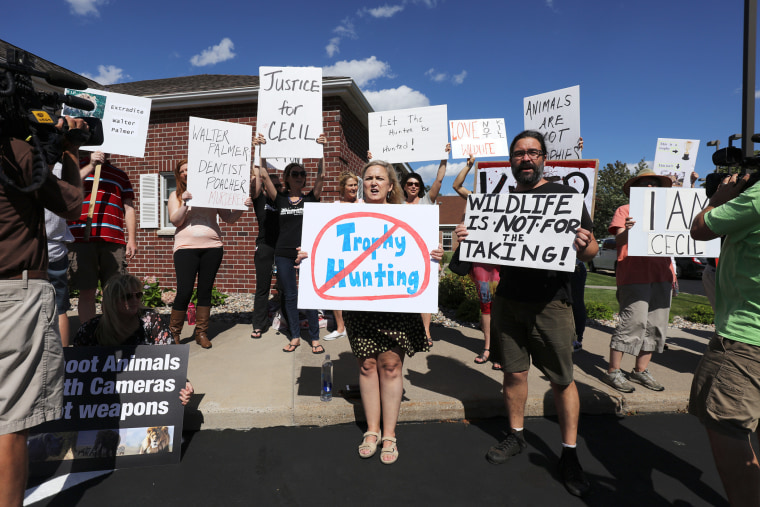Dentists don’t generate a lot of online love. But in the annals of negative dentistry feedback, no practitioner has earned quite the same torrent of invective as Walter Palmer, the now-notorious killer of Cecil the lion.
A quick scan of the Yelp page for his now-shuttered practice, River Bluff Dental in Bloomington, Minnesota, yields “reviews” like this one: “In an ideal world, you’d be hunted and shot in the neck with a crossbow.” Or this: “How does it feel to be hunted Walter? We don’t have a bow and arrow but we have the power of the WWW.”
The remarks reflect widespread, relentless public outrage over reports that Palmer lured Cecil out of a Zimbabwe sanctuary and wounded him with a bow and arrow before finishing him off with a rifle. (Palmer, in a statement, said he relied on local guides and thought the hunt was legal.) Officials in the U.S. and Zimbabwe are still sorting out potential charges and possible extradition. And I, for one, agree with everyone who feels angry that Cecil was hurt, much less killed, for sport.
But the case of the infamous dentist offers a perfect opportunity to examine an increasingly urgent issue: Is there any recourse against online threats? When do hostile posts cross the line into actionable, even criminal behavior?
RELATED: Home of lion hunter Walter Palmer, dentist who killed Cecil, vandalized
When it comes to online harassment, U.S. law balances a desire to shield targets from harm against protection of fundamental First Amendment privileges. Generally, speech is free. But something called a “true threat” (yes, it’s a legal term) can be the subject of criminal prosecution. At issue: what the speaker means, precisely, when she lashes out and just how concrete the threat is.
“If I post ‘I am going to kill you,’ it’s not enough that you feel threatened,” says Justin Patchin, criminal justice professor at the University of Wisconsin-Eau Claire and co-director of the Cyberbullying Research Center. “Do I have a weapon? A plan? Access to you? These factors come into play, and it’s more the intent of the threat maker” than how the potential target feels, he says.
“If I post ‘I am going to kill you,’ it’s not enough that you feel threatened.”'
That requirement underscores a recent ruling by the United States Supreme Court, which issued its first-ever decision on social media and free speech in June. The justices struck down the conviction of a man who tormented his estranged wife with Facebook threats. Prosecutors, they held, failed to adequately prove the husband’s intent to threaten his wife.
In the Supreme Court case, just one man was lobbing hostile threats. Palmer, the dentist, faces a chorus. Does the number of perpetrators matter under the law?
Not necessarily, says Professor Danielle Citron of the University of Maryland Carey School of Law, author of "Hate Crimes in Cyberspace." While a group may be more frightening than an individual, context matters most in threat assessments. “Bright lines don’t apply,” she says.
Criminal charges for threatening speech are difficult to bring, but civil claims, like intentional infliction of emotional distress or defamation, could, theoretically, be available to Palmer, says Patchin. Though for those claims, he notes, the biggest challenge can be proving monetary damages, not just reputational harm.
Of course, these issues are almost certainly low on Palmer’s current list of concerns. After all, it’s hard to focus on launching a lawsuit when you’re standing under a Niagara of national condemnation and face the prospect of a criminal trial – and possible imprisonment – in a foreign country. Not to mention, other, physical threats against Palmer have emerged: His South Florida home was vandalized, and police are looking for a perpetrator who could be charged with criminal mischief.
But the cyber-backlash against this infamous dentist raises important issues of free speech and its consequences in the age of connectivity.
“What this case really has brought to light,” says Citron, “is just how destructive cyber mobs can be.” If reports of Palmer’s actions are accurate, she says, “Yes, he’s done something despicable, but the attacks are despicable as well.”
Lisa Green is an MSNBC legal analyst and author of “On Your Case: A Comprehensive, Compassionate (and Only Slightly Bossy) Legal Guide for Every Stage of a Woman’s Life.”
